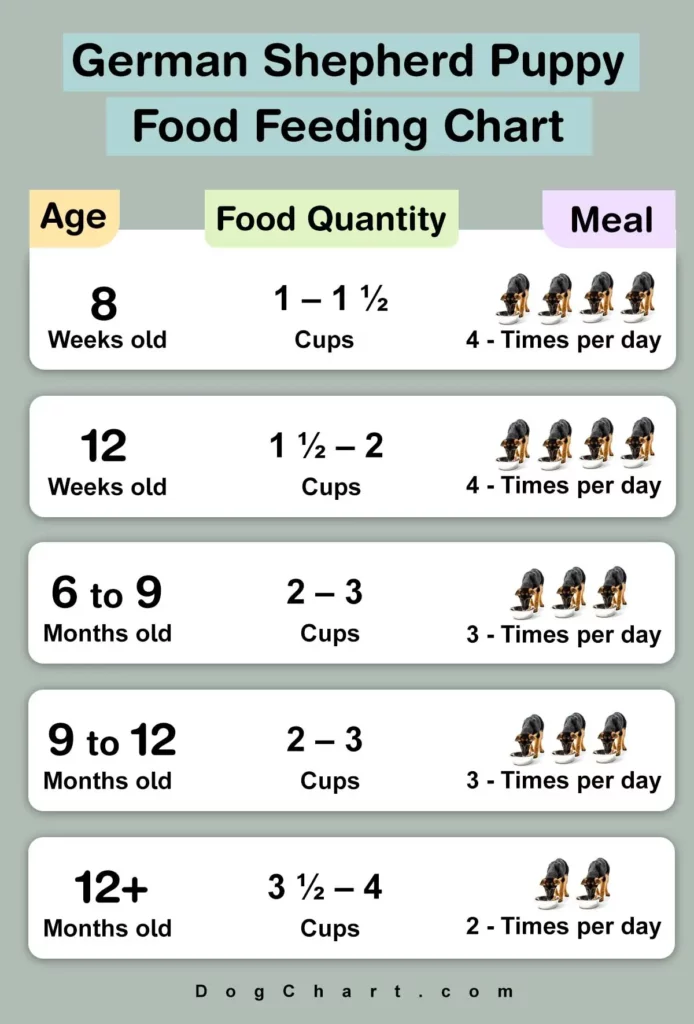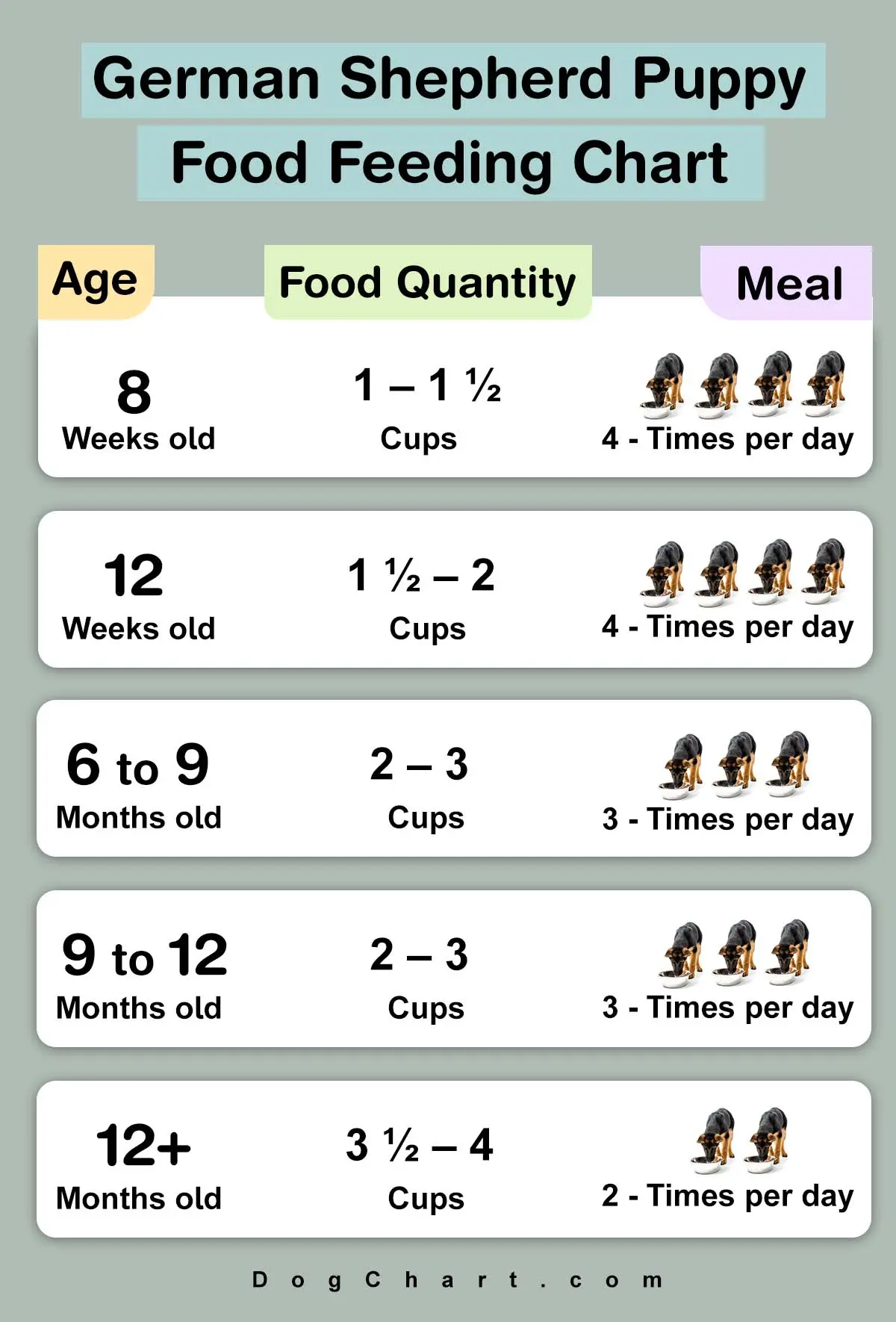It’s pretty impossible to maintain emotional distance when a cute puppy like a German Shepherd enters your house. The German Shepherd is known for being a very loving and affectionate breed. To guarantee healthy growth into a giant dog, their food is crucial.
Feeding a German Shepherd puppy the wrong kind of food, too little food, or food that is too high in fat or sugar are all common errors. Many pet owners, then, wonder what a healthy diet for a German Shepherd puppy entails.
We explain how much and what kind of food is ideal for a German Shepherd puppy at different ages. To that end, we’ve included a helpful German shepherd puppy food chart to show you when and how much to feed your new addition.

German Shepherd Puppy Food Chart
| Puppy Age | Total Cups of Dry Kibble | Number of Meals Per Day |
|---|---|---|
| 8 weeks old | 1 – 1 ½ cups | 4 |
| 12 weeks old | 1 ½ – 2 cups | 4 |
| 6 months to 9 months old | 2 – 3 cups | 3 |
| 9 months to 12 months old | 2 – 3 cups | 3 |
| 12 months old and above | 3 ½ – 4 cups | 2 |
Weekly Nutritional Requirements for Your German Shepherd Puppy
Stick to a feeding plan that accounts for your dog’s age and choose the best food for a German shepherd puppy.
You may use these feeding guidelines and charts to help your new pet develop into a healthy, muscular adult. Determine how old your puppy is, and then stick to the standards for promoting healthy, athletic development.
6-Week-Old
During this time, your puppy needs to remain close to its mother so that it can nurse.
Canned, moist meals are introduced in minimal quantities. Nonetheless, infants still have the vast majority of their nutritional needs met by their mothers’ milk.
Colostrum, antibiotic-rich milk found only in the mother’s milk, helps to keep the newborn puppy healthy throughout the first eight to ten weeks of its life.
8-Week-Old
Hard kibble should be soaked with warm goat’s milk and sit for 10 minutes before being served to your GSD puppy, starting at 8 weeks.
Your GSD puppy will get sufficient of the vitamins and minerals they need at this critical period of their life from the goat’s milk that is both easy to digest and rich in these nutrients.
Also read: German Shepherd Puppy Exercise Guide
10-Week-Old
Maintain the same diet as given in week 8. If you’ve found a brand of best kibble for german shepherd puppy that your dog loves eating and that has a beneficial effect on his health, stick with it and look after german shepherd puppy food.
If your dog seems happy, healthy, and energetic on its current diet, there’s no need to make any changes.
12-Week-Old
The kibble should be fed continuously. If they seem to appreciate goat’s milk, you may keep giving it to them.
You should watch for abnormal weight gain during this phase of rapid development.
14-Week-Old
Ensure your puppy maintains a healthy weight to look and perform at its best. You can maintain your German Shepherd puppy at a healthy weight by recording its daily food intake and making appropriate adjustments as it grows.
16-Week-Old
Around this time, you may find that your puppy rushes through their dinner in search of more. They are probably going through a growth spurt, so it’s OK to start feeding them a little extra kibble.
It’s essential to limit the number of sweets they get each day. Keep an eye on how many calories your puppy is consuming from snacks.
18-Week-Old
Weighing your puppy on a scale can help you track its growth. You may accomplish this by carefully cradling the animals in your arms while standing on the scale. Then, ditch them on the floor before stepping barefoot on the scale.
20-Week-Old
When your puppy is around 5 months old, you may see a rise in height and body weight. A German Shepherd puppy should start filling out at this age, but they shouldn’t be overweight.
22-Week And Older GSD Puppy
Your German Shepherd dog still needs dry kibble with some wholesome treats. It’s OK to taper down the proportion of nutritious foods you eat over time. Although, older German Shepherds still like a few delectable toppings on their food.
What Nutrients Does a German Shepherd Puppy Need?
To develop healthily and have enough stamina for their busy lifestyle, German Shepherd pups need a diet high in protein. The protein content of your puppy’s food must be at least 22%. Fish, poultry, and beef are all excellent options for getting protein. Stick to a proper gsd puppy food chart.
Your German Shepherd puppy should get at least 5% of its calories from fat, as our food chart recommends, to ensure they develop a thick, healthy coat and good skin. Veggies and fruits like peas and potatoes are excellent sources of the 5–8% of carbohydrates your puppy needs.
In addition, your puppy’s food should include minerals, vitamins, probiotics, antioxidants, water, and omega fatty acids to keep its immune system strong.
Also read: German Shepherd Growth
1. Royal Canin German Shepherd Puppy
Royal Canin Puppy Food is what we propose as the finest brand for German Shepherd puppies. In particular, this meal is excellent because it meets German Shepherds’ unique dietary and health requirements.
Because of their delicate digestive systems, German Shepherd pups need the best homemade food for german shepherd puppies on their stomachs yet still provide enough nourishment.
Pros:
- Created with German Shepherds in mind
- This kibble is designed with German Shepherd muzzles in mind.
- It helps pups build a robust immune system
- Intuitively understandable
- Aids in maintaining healthy bones and joints
Cons:
- Having fillers in it.
2. Blue Buffalo Wilderness Puppy Food
We recommend Blue Buffalo Wilderness puppy chow for GS pups as an alternative according to this German Shepherd Puppy Food Chart. This item contains no grains or animal by-products in its preparation.
In addition to actual chicken, its high protein content makes it a good option for bulking up. Every bag of this food is guaranteed to be fresh since it contains no preservatives.
Pros:
- There are no additives, fillers, or by-products.
- The actual chicken was used in this dish.
- DHA and ARA are present in the formula.
- Non-grain in every way
- A fabulous combination of antioxidants, vitamins, and minerals.
Cons:
- Some pups might have an adverse reaction to the high protein content.
3. Pro Plan Focus by Purina
We recommend Purina Pro Plan Focus as an affordable option for healthy dog food. This food is designed to provide a healthy nutritional foundation for your puppy from its first meal.
You can ensure that your puppy’s brain is generally developing by giving it fish oil, which is rich in omega-3 fatty acids. Glucosamine, which is beneficial to the growth and health of joints, is included as well.
Pros:
- DHA, an omega-3 fatty acid found in fish oil, is beneficial to brain development.
- Immune-boosting mixture high in antioxidants
- Completely protein-based
- Suitable for puppies and dogs up to a year old
- Includes glucosamine from a natural source
Cons:
- Some chicken scraps are used in the mix.
4. Food for Large-Breed Puppies by Eukanuba
As an alternative, the Eukanuba puppy chow for giant breeds is an excellent option for German Shepherd pups. The high DHA content and other minerals in this diet will promote healthy physical and mental development in your puppy.
The moderate amount of calories, protein, and fat in this is ideal for keeping GS lean and active, especially since it was formulated for larger breeds.
Pros:
- Increased amounts of DHA for cognitive growth
- Premium poultry.
- Encourages the development of muscular mass
- The perfect ratio of fat to carbs.
- Bone-building calcium content.
Cons:
- Contains derivatives of animal origin
5. Taste of the Wild High Prairie Puppy
The last top pick is Taste of the Wild’s High Prairie Puppy Blend. This item is substantial in protein and has no gluten, sugar, or additives.
You can trust that it contains high-quality meat since the first component mentioned is buffalo. The theory behind this product is that being canine descendants of wolves, dogs need a diet similar to that of their ancestors.
Pros:
- Best-in-class protein
- Antioxidants and DHA are present.
- Prepared with grilled bison and venison
- Free of grains and additives
- Probiotics included.
Cons:
- Very low in fiber; not recommended for all dogs.
Conclusion
With the German shepherd puppy food chart, you can also get German shepherd starter food to build their metabolism and good appetite. Stick to the guidelines mentioned above and let us know what helped you the most in the comment section below.

